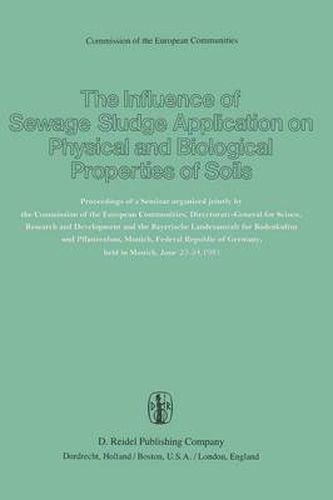Readings Newsletter
Become a Readings Member to make your shopping experience even easier.
Sign in or sign up for free!
You’re not far away from qualifying for FREE standard shipping within Australia
You’ve qualified for FREE standard shipping within Australia
The cart is loading…






This title is printed to order. This book may have been self-published. If so, we cannot guarantee the quality of the content. In the main most books will have gone through the editing process however some may not. We therefore suggest that you be aware of this before ordering this book. If in doubt check either the author or publisher’s details as we are unable to accept any returns unless they are faulty. Please contact us if you have any questions.
The agricultural value of sewage sludges is well known and a lot of published data has demonstrated the positive effects of sludge appli cations on plant growth and yield. These effects are probably due mainly to the nitrogen and phosphorus content of sewage sludges. But, as sludges are more organic than mineral, we can expect an effect of the organic matter added to the soil on soil fertility. Certainly, in the future, landspreading of sludges will be regulated, taking into account pollution hazards for waters (excess of nitrogen and phosphorus supply compared to plant needs and soil storage capacities) and for soils (excess of heavy metals supply and build up in soils). There will be regulations fixing what low level of sludges may be spread each year, decreasing their comparative value with respect to mineral fertilizers. In this eventuality, the organic value of sludges will take on a greater importance and several questions arise : - what is the lowest amount of sludge to be spread to have an immediate effect on soil physical properties? - are sludges effective on soil physical properties when spreading repeated low amounts? On the other hand, organic matter and soil biology are closely linked and there are few data on the possible effects - beneficial or detrimenta- on soil organisms.
$9.00 standard shipping within Australia
FREE standard shipping within Australia for orders over $100.00
Express & International shipping calculated at checkout
This title is printed to order. This book may have been self-published. If so, we cannot guarantee the quality of the content. In the main most books will have gone through the editing process however some may not. We therefore suggest that you be aware of this before ordering this book. If in doubt check either the author or publisher’s details as we are unable to accept any returns unless they are faulty. Please contact us if you have any questions.
The agricultural value of sewage sludges is well known and a lot of published data has demonstrated the positive effects of sludge appli cations on plant growth and yield. These effects are probably due mainly to the nitrogen and phosphorus content of sewage sludges. But, as sludges are more organic than mineral, we can expect an effect of the organic matter added to the soil on soil fertility. Certainly, in the future, landspreading of sludges will be regulated, taking into account pollution hazards for waters (excess of nitrogen and phosphorus supply compared to plant needs and soil storage capacities) and for soils (excess of heavy metals supply and build up in soils). There will be regulations fixing what low level of sludges may be spread each year, decreasing their comparative value with respect to mineral fertilizers. In this eventuality, the organic value of sludges will take on a greater importance and several questions arise : - what is the lowest amount of sludge to be spread to have an immediate effect on soil physical properties? - are sludges effective on soil physical properties when spreading repeated low amounts? On the other hand, organic matter and soil biology are closely linked and there are few data on the possible effects - beneficial or detrimenta- on soil organisms.